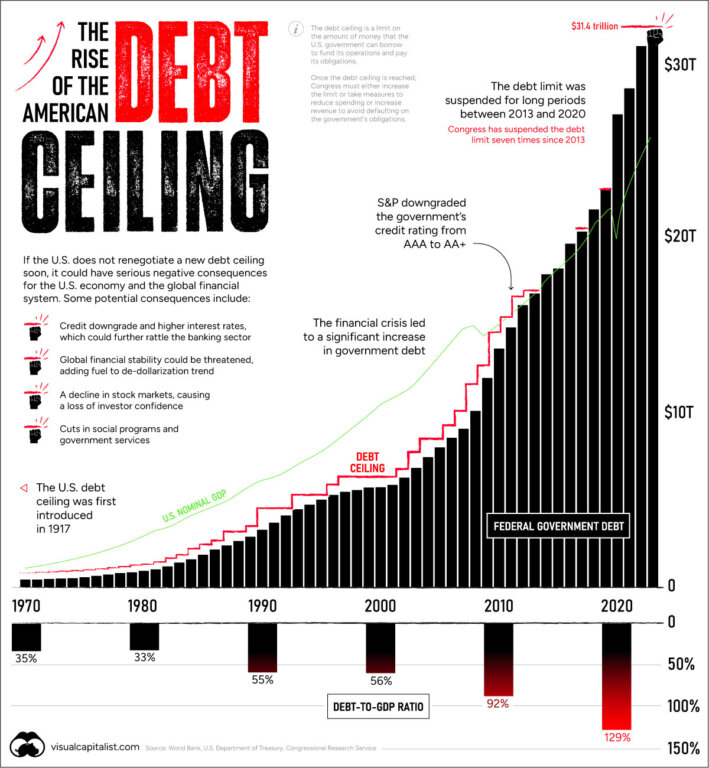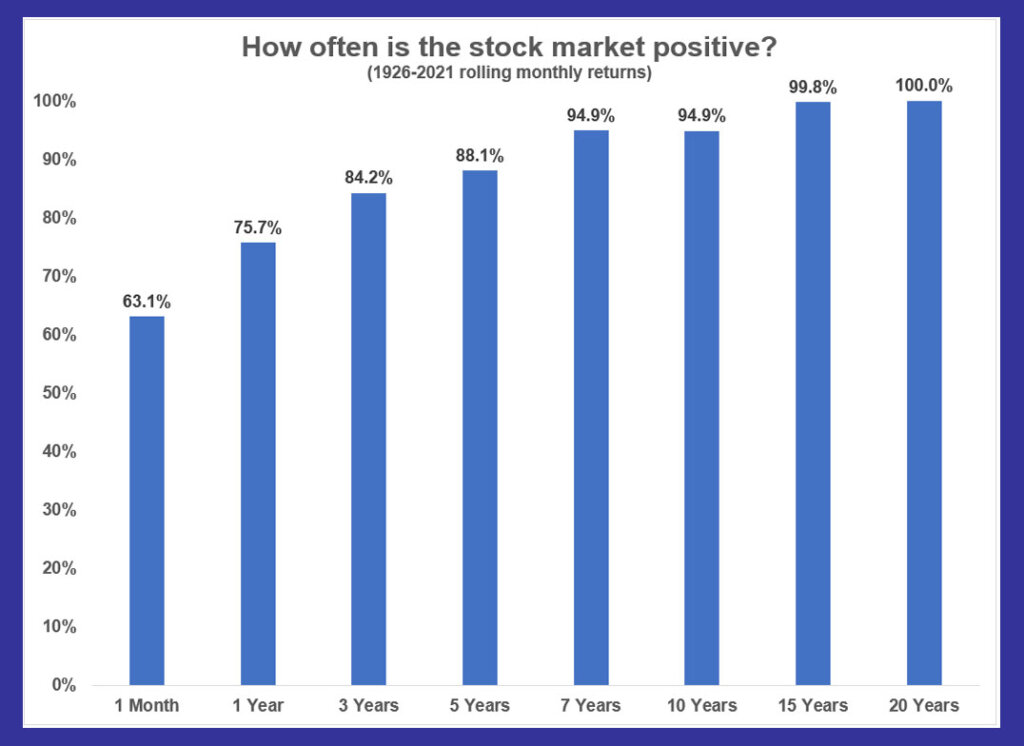Making sense of the markets this week: May 28, 2023

Presented By
Harvest ETFs
Worries about the debt ceiling, Canadian banks earn slightly less, U.S. retailers tread water, Nvidia soars on A.I. hype, and it pays to be an optimist.
Advertisement

Presented By
Harvest ETFs
Worries about the debt ceiling, Canadian banks earn slightly less, U.S. retailers tread water, Nvidia soars on A.I. hype, and it pays to be an optimist.

Kyle Prevost, editor of Million Dollar Journey and founder of the Canadian Financial Summit, shares financial headlines and offers context for Canadian investors.
By far, the dominant force influencing markets this week was the completely illogical farce that is “the U.S. debt ceiling” debacle.
We try not to delve deeply into partisan politics here, as we try to keep focus on the more nuanced and interesting forces of the world’s financial markets. That said, even at the best of times, it’s impossible to separate economics and politics. And, these are hardly the best of times.
For those unfamiliar with the U.S. debt ceiling drama, you likely have three questions:
This nicely answers, what is the U.S. debt ceiling?:
2/ First things first, what is the debt ceiling? The debt ceiling is a legal limit set by Congress on the total amount of debt that the U.S. government can accumulate. It’s like a credit limit on a credit card.
— RahulPareek (@_Rahul_pareek) May 22, 2023
In the answers to the first two questions, I think you can decide for yourself how much the “drama” pertains to you.
“Hitting the debt ceiling” is typically a legislation vote to raise the maximum level of national debt that the U.S. Department of the Treasury is allowed to borrow. To be clear, this is not a new budget debate about new spending. Instead, it allows the U.S. Treasury to go about its usual business and pay for the spending already agreed upon by the previous governments.
As you might imagine, accounting at the Treasury is complicated. We’re talking about taxes rolling in, money for payments to seniors and veterans going out, and so on. With so many moving parts, Treasury Secretary Janet Yellen says she doesn’t know the exact date when Uncle Sam’s piggy bank will be emptied, but her best prediction is June 1, 2023.
Before we get into how bad things could get, consider… this could be “A steep economic downturn […] It could upend the lives of millions of Americans and those around the world,” according to Yellen’s words,
One would think a group of reasonable individuals elected to run the country would quickly agree that it’s best not to run the vessel of their economy into a self-made iceberg. Unfortunately, that’s not how the Republican Party works. Apparently, it’s perfectly acceptable to run an economy into that self-made iceberg, if you think it makes a democratic president look bad.
It bears repeating (as it often gets lost in the noise) that lifting the debt ceiling has been presented as a debate between budget priorities—but it is not. It’s a vote that essentially says, “OK, Secretary Yellen. You can borrow money to pay the bills.” Pretty much no other country in the world thinks it’s a good idea to debate whether it should pay for the commitments it has already made.
Now, you might be thinking: “That sounds like a raw deal for pensioners, veterans and the millions of Americans sent monthly government cheques. It’s also unfortunate for the people and companies invested in U.S. bonds and treasury bills.” You might also ask: “Why should Canadians care?!”
Turns out, because the world depends on American debt as a “store of value” for individuals and businesses (bonds and treasury bills as safe bets), the U.S. government refusing to pay its bills will likely shake the faith that lending money to any government or business should be considered “low risk.”
This could lead to higher interest rates (for investments and borrowing), a fundamental reassessment of investment risk, a loss of trust in the United States on the world stage, and basically complete economic chaos. Estimates suggest that the American stock markets (which make up over half of the money invested in the world’s stock markets) would fall 45%, if the debt ceiling was reached and there was no deal in place to make sure U.S. debt payments were made.
So, should you care?
If the U.S. debt defaults, millions of people will lose their jobs, the value of your portfolio might be cut in half, and it’s quite likely the world’s economy would completely seize up in an event akin to the Great Depression.
The good news is that the debt ceiling has been raised multiple times, and a majority of those times happened with a Republican president. The most recent reports out of Washington suggest that reaching a deal is more and more likely. Thankfully, America has never failed to repay its debts. As we were going to press Friday morning, markets were broadly up early Friday, after Reuters reported that President Joe Biden and Speaker Kevin McCarthy appeared to be near to a two-year deal to raise the ceiling and cap most spending.
So, in assessing just how much it should matter to you, one has to try to quantify the risk of a fairly unlikely event (estimates range from 2% to 25%), but it has massive consequences if it does happen. Given how American stock markets looked this week, as well as the news that our neighbour’s debt rating was at risk of being lowered, I’d say that investors are generally beginning to assess that risk when making market decisions.
If you have any American friends, maybe get them to call their political representative and tell them not to steer us all into that economic iceberg. One would hope that cooler heads will prevail.

It was a subdued earnings season for Canada’s Big Five Banks as they announced this week that increased provision for credit loss ratios had led to slightly lower profit margins.
Bank of Montreal (BMO/TSX): Earnings per share of $2.93 (versus $3.23 predicted) and revenues of $8.44 billion (versus $8.26 billion predicted).
Bank of Nova Scotia (BNS/TSX): Earnings per share of $1.70 (versus $1.77 predicted), and revenues of $7.93 billion (versus $8.01 billion predicted).
Royal Bank of Canada (RY/TSX): Earnings per share of $2.65 (versus $2.81 predicted), and revenues of $13.52 billion (versus $13.16 billion predicted).
Canadian Imperial Bank of Commerce (CIBC/TSX): Earnings per share of $1.70 (versus $1.63 predicted), and revenues of $5.7 billion (versus $5.69 billion predicted).
Toronto-Dominion Bank (TD/TSX): Earnings per share of $1.94 (versus $2.08 predicted), and revenues of $12.54 billion (versus $12.38 billion predicted).
Overall, it appears that investors took these mediocre earnings in stride. CIBC was the major winner, and was up just over 2% on Thursday, while BMO and TD were down about 4% each the day they announced earnings. Scotia was down 1.28% on Wednesday, and RBC was down 1.83% on Thursday.
Everyone is thankful for the conservative nature of Canadian banking when the worst-case scenario hits and those increased provisions come in handy. Not nearly as many people express gratitude when the trade-off in decreased profit margins is reported. For more information, check out my article on investing in Canadian banks stocks at MillionDollarJourney.ca.
In a continuation of the mixed news that we saw from Wal-Mart, Target, and Home Depot last week, this week’s earnings announcements revealed that the market appears to have a pretty accurate gauge on the performance of big retailers. (All numbers below are in U.S. currency.)
As for artificial intelligence (AI)… In contrast to the largely expected retailer news, AI-chip king Nvidia (NVDA/NASDAQ) surprised analysts this week as earnings-per-share came in at $1.09 versus $0.92 predicted. The stock quickly rose over 24% on Thursday, bringing its market capitalization close to $1 trillion.
We’ll keep an eye on the U.S. debt ceiling situation, but in the meantime, let’s look at the broader situation.
This week, financial blogger Ben Carlson wrote an interesting piece about how well your nest-egg would have done out over the long term as an investor in the U.S. stock market.

Here are my key takeaways from it:
Being pessimistic may make many of us feel smart, but it looks like optimistic folks are right more often than they are wrong when it comes to investment returns.
It was independently produced by MoneySense and is presented with financial support from the partner.
Kyle Prevost is a financial educator, author and speaker. When he’s not on a basketball court or in a boxing ring trying to recapture his youth, you can find him helping Canadians with their finances over at MillionDollarJourney.com and the Canadian Financial Summit.
Share this article Share on Facebook Share on Twitter Share on Linkedin Share on Reddit Share on Email